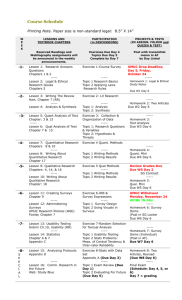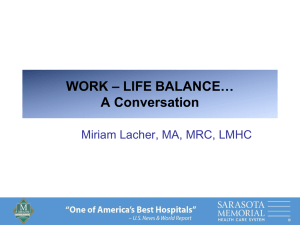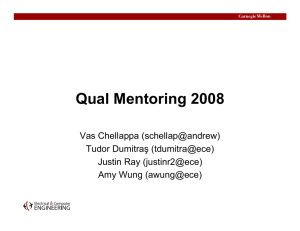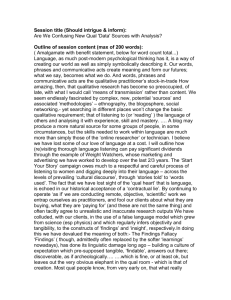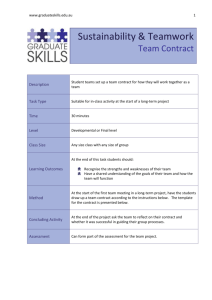available - University of South Australia
advertisement
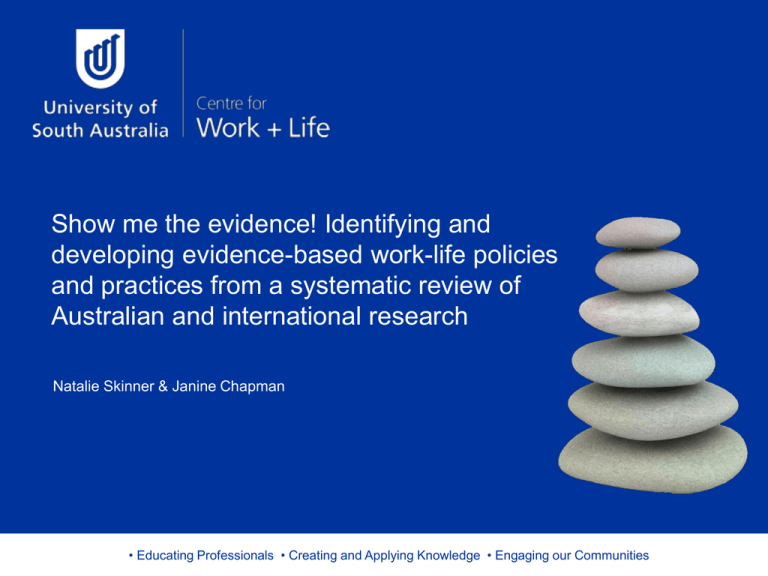
Show me the evidence! Identifying and developing evidence-based work-life policies and practices from a systematic review of Australian and international research Natalie Skinner & Janine Chapman • Educating Professionals • Creating and Applying Knowledge • Engaging our Communities Today ……. CWL review: •1,926 AU & international publications (2000 – 2013) Eby et al (2005) • 190 work-family studies 1980 – 2002 • quantitative psychology/management pubs Is there anywhere on earth exempt from these swarms of new books?” (Erasmus, early 16th century scholar) And further, by these, my sonne, be admonished: of making many bookes there is no end, and much studie is a wearinesse of the flesh. (Ecclesiastes, 1611 King James Bible) We have reason to fear that the multitude of books which grows every day in a prodigious fashion will make the following centuries fall into a state as barbarous as that of the centuries that followed the fall of the Roman Empire. (Adrien Baillet, 1685, French scholar and critic, biographer of René Descartes) CWL review ……2000 - 2013 • AU & NZ research in peer-reviewed journals • Quant + qual • N = 23 studies of general workforce • N = 43 (select) industry studies • 10 public sector • 17 health/social services • 16 construction • Less common: longitudinal • Rare: org interventions Inclusion criteria 1. The study must include measures of work-life outcomes • work-family or work-life conflict, facilitation, spillover, interaction, intersection etc 2. The study findings must be applicable to policy formation and development 3. The research must be located in Australia or New Zealand 4. The article must be published between 2000 and 2013 in a peerreviewed publication. International evidence - outcomes • 3 x meta-analyses • consistent: physical & psychological health, job satisfaction • .20 - .40 (burnout, stress) • mixed: absenteeism, performance, turnover intention • n.s to .29 • 10 x longitudinal studies • consistent: mental health (burnout, psych distress), sickness absence • Australian studies (n = 6) • Consistent: psych distress, turnover/absenteeism Performance & productivity • Meta-analyses of WLI-perf assoc: .11 - .16 • Complexity – measurement, predictors • Gilboa et al (2008): job ambiguity strongest predictor of performance • Indirect relationship via: • Reduced sickness absence / absenteeism • Greater motivation/commitment/effort (reciprocity norm) • Libby Holden & colleagues – AU study • longer hours reduced performance effectiveness & increased absenteeism Major policy areas: • Flexibility • Work hours • Leave (paid/unpaid) • Childcare Flexibility Australian studies • consistent: lower work-life interference (WLI) • mixed: type of flexible work practices International studies – meta-analyses & longitudinal studies • mixed: impact on WLI • n.s to -.30 • Nijp et al 2012: job satisfaction, organizational commitment, self-rated perf • *Best Buy intervention in U.S Hours Australian studies (n = 10) • Consistent: higher work-life interference (WLI) • Mixed: exact number of hours (40 – 41+) International studies – meta-analyses • Consistent: higher WLI • Actual hours & time demands (expectations to work long hours) • .21 to .27 Leave & childcare Where is the research on w-l outcomes (& do we need it)? • Australian qual studies on uptake of leave • Family/parenting strains, turnover • AWALI – uptake of paid leave (*mothers*) • AU qual studies on childcare • Women’s employment participation, reduced work-family stress What does it take …… ? ‘Best Buy’ Head Office – U.S Results-Only Work Environment (ROWE) • Employee and manager training, executive support • Flexible work the norm, regardless of gender, life stage, work role • Culture & practices: employees “do whatever they want, whenever they want, as long as the work gets done” • Workers change work arrangements without asking permission But wait, it’s complicated ……. “boundaryless” jobs & “greedy organisations” • Task & time autonomy, responsibility for work & outcomes • Performance linked to job security & promotion • Focus on high commitment to achieving work goals, no matter what the work hours required to achieve performance targets within strict deadlines A large number of Dutch workers “find themselves trapped in a cycle of unfinished tasks and after-hours duties despite new laws and regulations that broaden the individual possibilities to choose the desired amount of working hours” van Echtelt et al (2006) International studies – meta-analyses • N=8 • Organisational culture • .27 - .31 • Workload • .45 - .65 In sum….. • Educating Professionals • Creating and Applying Knowledge • Engaging our Communities Policy/practice Evidence Flexible work arrangements Offer a range AU (WLI) International (health/ org outcomes) Work hours (actual & expected) Cap at average of 40–41 hrs (?) AU & Int Paid leave – recreational & parental/care AU & Int (qual) Encourage/mandate uptake Rating workload, culture Fit with preferences ? Other considerations Men’s participation in parenting/ care (AU, Int) Women’s employment participation Infant/child health Psych research: rest & recovery Policy/practice Evidence Rating Other considerations Childcare services Organisations & governments AU & Int (qual) Workload AU & Int Qual & Quant ‘deal breaker’ Culture AU & Int Qual & Quant ‘catalyst’ ? Women’s employment participation Policy is necessary but not sufficient How do you change workplace cultures? • Make non-standard work practices mainstream • Not “special consideration” for “privileged few” • eg Best Buy in the U.S • Managers & supervisors embody & communicate organisational culture • Supervisor training • Address “unintended consequences” • Outcomes speak louder than policies • Protect against economic, social & career penalties • For employees and supportive managers • Importance of supportive co-workers We shall not cease from exploration And the end of all our exploring Will be to arrive where we started And know the place for the first time T.S Eliot, Four Quartets Lack of ‘downtime’ in non-work hours, increased stress 24/7 access to email & work tasks Feelings of compulsion to remain constantly connected & up-to-date Mazmanian et al (2013). The Autonomy Paradox: The Implications of Mobile Email Devices for Knowledge Professionals. Organization Science 21 Feel competent, productive, in control, enjoy flexibility Development of collective norm of being constantly available & responsive We shape our tools and afterwards our tools shape us Marshall McLuhan (1994) Natalie Skinner Senior Research Fellow Centre for Work + Life University of South Australia (08) 8302 4250 Natalie.Skinner@unisa.edu.au www.unisa.edu.au/Research/Centrefor-Work-Life/
